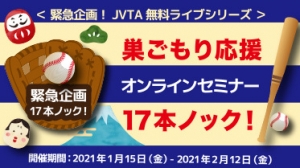Learning how to Laugh in Japanese at “Giggle without Google”

<イベントレポート>On January 17, viewers from around the world joined in for Giggle Without Google — the 2nd in JVTA’s 17-part series of Stay-Home Seminars.
This time, we tackled one of the trickiest topics for any translator: humor. Japanese comedy (“owarai”) features many unique cultural elements, and many would agree that appreciating it takes a high level of Japanese proficiency. But if you really want to laugh along with the latest owarai, your textbooks won’t help you make sense of the punchlines. JVTA’s J-E media translation instructors Ishii Kiyotake and Bill Reilly were our guides on a tour through the Japanese comedy world. Here are some of the stops along the way…
■ What makes owarai unique?
Japanese comedy can be broken down into a number of subgenres — some of which have rough cultural equivalents overseas. These include rakugo (solo standup), manzai (two-person standup), konto (sketches), sokkyou konto (improv), dokkiri (pranks), and parody. However, as Bill points out, the “torture-based” form of ijimewarai is also popular across all of these different styles. This tends to be a bit more common and lighthearted in Japanese variety shows than in other countries. So, if seeing your favorite celebs get dunked on is your idea of a good time, owarai has you covered.
■ The 6 key points of comedy
According to Bill, there are 6 main techniques in Japanese comedy: playing the boke, playing the tsukkomi, as well as wordplay, impressions, one-liners, and reactions. Watching a few examples of these in action, the class tried their hand at identifying what techniques different comedians were using in each scene. The Zoom chat got pretty heated up as the class took their guesses at each one — especially for the rapid-fire one shot gags!
■Japanese comedy is a great way for beginners to stretch their skills
Different styles of owarai require different levels of understanding in Japanese language and culture, but that doesn’t mean beginners have to miss out on the fun! Bill put together a handy guide of different owarai acts, putting the spotlight on comedians and characters whose style is full of colorful characters and costumes, making owarai accessible even at a basic Japanese level. In fact, many of these comedy routines make for a great way to learn more about Japanese language and culture!
Closing out the session, Bill reminded us that laughter isn’t just the universal language — it can even help you improve your Japanese.
If you missed the live stream, stay tuned to JVTA’s YouTube for the highlight reel in the coming days!
◆Join us for more online events for anyone interested in Japanese language, media and translation! Upcoming events include:▶here
◆◆◆映像翻訳にご興味がある方◆◆◆
<2021年4月期「英日映像翻訳 総合コース・Ⅰ」受講生募集中>
まずは2/14(日)9:30より開催の無料イベント「リモート・オープンスクール」にご参加ください。

※詳細・お申し込みは▶こちら
【緊急企画!】JVTA無料ライブシリーズ
「巣ごもり応援 オンラインセミナー 17本ノック!」
開催期間:2021年1月15日~2021年2月12日
◆おすすめイベント◆
「落ちこぼれ生徒の私が映像翻訳ディレクターになるまで」
2021年2月10日(水) 19:30~20:10
※詳細・お申し込みは▶こちら
語学が導いた私のキャリアステップ ~就職・海外赴任・起業を成し遂げたヒントを教えます~
2021年2月12日(金) 19:30~20:10
※詳細・お申し込みは▶こちら
◆その他のラインナップ

どなたでも無料でご参加いただけます。
各イベントの詳細は▶こちら










